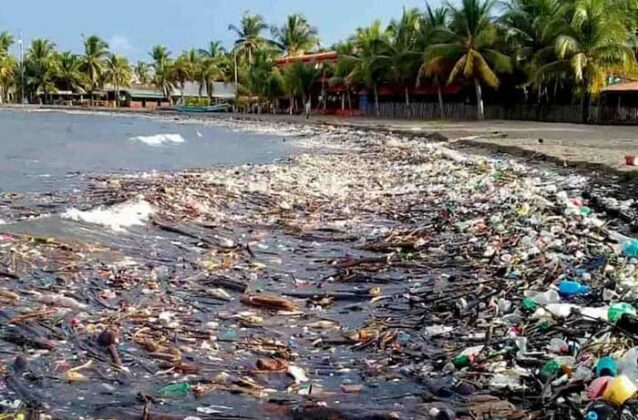Masks, gloves, gauze, containers, and all kinds of waste arrive in coastal and tourist areas of Honduras, especially in the rainy season, that have been dragged by the Motagua River from the capital of Guatemala after flowing into the Caribbean Sea. This foreign garbage, which accumulates on Honduran beaches and on the seabed, affects the environment and tourism, one of the main activities that sustain local communities such as those in the municipality of Omoa. For more than a decade, the inhabitants of these areas have cleaned their beaches manually to try to avoid the images of their beaches turning into garbage dumps, but binational measures are needed to eradicate the massive garbage coming from abroad.
The Motagua River, with a length of 486 kilometers and a basin covering more than 12,000 square kilometers, originates in the Guatemalan highlands, and one of its tributaries, the Las Vacas River, flows through the enormous garbage dump located in the north of the Guatemalan capital. In addition, the inhabitants of the Guatemalan municipalities bordering the Montagua River throw their garbage into the river without any consequences. However, successive Honduran governments have limited themselves to protest, but without taking concrete measures.
Recently, the mayor of the Honduran municipality of Omoa, Ricardo Alvarado, once again highlighted the serious contamination of the Motagua River and the beaches of his municipality, which has driven away tourism, the main source of income for the Omoa population. Although the Honduran government speaks of a crisis, the reality is that what the inhabitants of Omoa are suffering is an environmental catastrophe.
This problem, which has been going on for more than a decade, has been the subject of conversations between the governments of both countries. But the definitive and ecological solution, which is to create sanitary landfills in the Guatemalan municipalities that comply with international standards, has not been taken into account by the successive governments of that country, nor has it been demanded by their Honduran counterparts.
The “solution” proposed by the Honduran government recently was to place biosecurity fences along the Las Vacas and Motagua rivers, to which Guatemala agreed. However, recently, the amount of waste dumped into the river was such that the fences gave way and let in a large amount of garbage, which is reaching the beaches of Omoa, already seriously polluted.
Although Omoa’s community authorities and private companies are working to keep the beaches clean, this is not enough. The recent and abundant “winter” rains, as the rainy season is called in this region, aggravated the problem, as the course of the rivers increased, and the fences put up by the organization The Ocean Cleanup were overcome. On the other hand, the planned fence system has not been completed, which has further complicated the situation.
Another aggravating factor of this environmental problem is that the waste is not sorted in the Guatemalan dump, located in the north of Guatemala City, which is crossed by the Las Vacas River and has an extension of approximately eight soccer fields. Normally plastic is the main pollutant, but with the COVID-19 pandemic, much of what runs down the rivers are contaminated hospital waste.
Omoa is suffering the effects of a phenomenon that should have long ago been a matter of urgent concern to the national government. However, while this municipality languishes and suffers a growing displacement of its population, and even emigration abroad, for the moment there does not seem to be a Honduran government department concerned enough about the problem to start negotiations with its Guatemalan counterparts in order to find definitive solutions. Nor is there any intention to promote an international campaign to give visibility to the problem and even obtain funding to convert the Guatemalan dumps into sanitary landfills.
It is not very encouraging to expect Honduran officials and former officials to demand solutions from the neighboring country when they have left unfinished landfill projects in their own country, such as those in the capital and San Pedro Sula.
Translated from Spanish by Janaína Ruviaro da Silva











